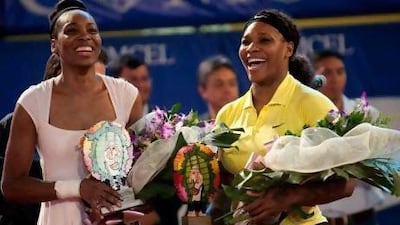The Waugh twins and Chappell brothers of Australia in cricket, the Charltons and Nevilles in English football; Vitali and Wladimir Klitschko in boxing, Formula One's Michael and Ralf Schumacher and the Manning brothers in American football.
Those illustrious names would figure prominently in any list of the sporting world's greatest siblings, but none of them have probably dominated their sport like the Williams sisters, Venus and Serena.
The Williamses have won 20 grand slams between them (Serena 13 and Venus 7) and finished runners-up in 11 others. Outside the four majors, Venus has 35 singles crowns and an Olympic gold (Sydney 2000), while Serena has 28 individual titles.
They have also won 12 grand slam doubles championships and together their prize money alone stands at a staggering US$65 million (Dh238,752m); Serena ($36m) has won more career prize money than any other female athlete in history. Both have been at the top of the WTA Tour rankings as well – Venus for 11 weeks and Serena for 123 weeks – since starting their careers as 13 year olds in 1994 and 1995 respectively.
Now in their 30s, their powers seem to be on the wane. The sisters have not won a major since Serena's 2010 Wimbledon triumph; Venus's last grand slam win came at the same event two years earlier, and she has made only one final in 14 major tournaments since: at Wimbledon again, in 2009.
There has not been much joy for the sisters this year either. Last month in Paris, Serena suffered her first opening-round defeat in any of the four grand slams. On Monday, Venus failed to go beyond the first round of Wimbledon for the first time since her debut at the All England Club in 1997. It was only her third opening-round defeat in 56 grand slams.
Both sisters, however, remain adamant they are not about to bid goodbye to their sport.
"I have no intention of stopping, and I don't think she [Venus] does either," Serena said earlier this week. "I enjoy being out there on the court so much. That's what I love. I love stepping out on that court, having that atmosphere, that moment. That moment is all about me. Maybe it's a little selfish, but I love that feeling."
An unfortunate accident to her foot and a blood clot in her lungs have restricted Serena's appearance on the court in recent years. As she celebrated her 2010 Wimbledon triumph at a restaurant in Munich, she stepped on broken glass and received 12 stitches on one foot and six on the other.
The cuts were proved more serious than initially thought and she later had surgery to repair a lacerated tendon on the top of her right foot.
The injury forced her to miss the next three grand slams events and then in March, 2011, doctors discovered a hematoma and a pulmonary embolism (blood clot in her lungs). Serena eventually returned to the court at Wimbledon after almost a year out and reached the fourth round before making it to the final at the US Open.
Venus has had her share of health issues as well, but none more serious than the chronic fatigue-inducing condition called Sjogren's syndrome that she was recently been diagnosed with. The condition forced her to pull out of the Australian Open and her ranking has slipped to No 135.
Anybody watching her slump to a 6-1, 6-3 defeat against Elena Vesnina on Monday could see she was struggling on the court. "She looks like a shadow of her grass-court self," said Pam Shriver, a former Wimbledon champion and now analyst.
"Am I struggling?" Venus responded, clearly upset when someone suggested just that at the post-match press conference. "Am I? I don't know. Tell me what the struggle is."
Clearly, struggle holds a different meaning for the Williams sisters. Born and raised in one of the tougher neighbourhoods of Los Angeles, they have suffered many misfortunes along the way, including the murder of their elder sister, Yetunde Price.
"I feel like I am a great player," Venus said after her most recent defeat. "I am a great player. Unfortunately, I have had to deal with circumstances that people don't normally face in this sport. There's no way I'm going to sit down and give up just because I have a hard time the first five or six freakin' tournaments back. That's just not me. I'm tough, let me tell you, tough as nails."
Serena sees herself in a similar light. "I love competing," she said. "I love the challenge. I love holding up trophies. So I guess if ever I feel that I can't do that, then maybe I won't play anymore."
At the moment, there is little chance of that happening. Tennis pundits still rate her as the player to beat on the women's circuit.
And she made a strong start to Wimbledon today, coming through an athletic first-round match against Czech Barbora Zahlavova Strycova that was tougher than the 6-2, 6-4 scoreline would suggest.
"You can name anybody, including [Maria] Sharapova [the current women's No 1], and you put them head to head, Serena is the clear favourite," Cliff Drysdale, an ESPN analyst, said recently. "I still think she's the best player in the business."
Follow us

